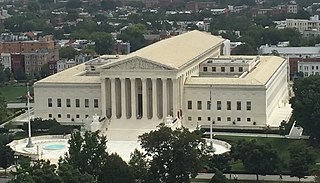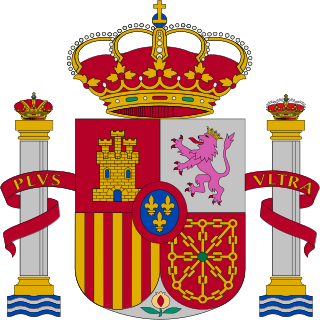
An appellate court, commonly called a court of appeal(s), appeal court, court of second instance or second instance court, is any court of law that is empowered to hear a case upon appeal from a trial court or other lower tribunal. In much of the world, court systems are divided into at least three levels: the trial court, which initially hears cases and considers factual evidence and testimony relevant to the case; at least one intermediate appellate court; and a supreme court (or court of last resort) which primarily reviews the decisions of the intermediate courts, often on a discretionary basis. A particular court system's supreme court is its highest appellate court. Appellate courts nationwide can operate under varying rules.
An ecclesiastical court, also called court Christian or court spiritual, is any of certain non-adversarial courts conducted by church-approved officials having jurisdiction mainly in spiritual or religious matters. Historically, they interpret or apply canon law, a basis of which was the Corpus Juris Civilis of Justinian, which is also considered the source of the civil law legal tradition.
In common law systems, a superior court is a court of general jurisdiction over civil and criminal legal cases. A superior court is "superior" in relation to a court with limited jurisdiction, which is restricted to civil cases involving monetary amounts with a specific limit, or criminal cases involving offenses of a less serious nature. A superior court may hear appeals from lower courts. For courts of general jurisdiction in civil law system, see ordinary court.

The Judiciary of the Hong Kong Special Administrative Region is the judicial branch of the Hong Kong Special Administrative Region. Under the Basic Law of Hong Kong, it exercises the judicial power of the Region and is independent of the executive and legislative branches of the Government. The courts in Hong Kong hear and adjudicate all prosecutions and civil disputes, including all public and private law matters.

The law of Brazil is based on statutes and, partly and more recently, a mechanism called súmulas vinculantes. It derives mainly from the European civil law systems, particularly the Portuguese, the Napoleonic French and the German.

Tokyo High Court is a high court in Kasumigaseki, Chiyoda, Tokyo, Japan. The Intellectual Property High Court is a special branch of Tokyo High Court. Japan has eight high courts: Tokyo, Osaka, Nagoya, Hiroshima, Fukuoka, Sendai, Sapporo, and Takamatsu. Each court has jurisdiction over one of eight territories in the country. Each has a president and several high court judges. Typically three judges will sit to hear a case, though in some cases - such as ones related to insurrection - five judges will sit.
The judicial system of Greece is the country's constitutionally established system of courts.
Within the Catholic Church, an ecclesiastical judge is an ecclesiastical person who possesses ecclesiastical jurisdiction either in general or in the strict sense. The judge presides over all baptized persons within their jurisdiction.

The Superior Court of Justice is the highest appellate court in Brazil for non-constitutional issues regarding federal law. The STJ also has original jurisdiction over some cases. Its jurisdiction is provided for in Article 105 of the Brazilian Constitution.

The tribunals of first instance are the main trial courts in the judicial system of Belgium. The tribunals of first instance are courts of general jurisdiction; in the sense that they have original jurisdiction over all types of cases not explicitly attributed to other courts. They handle a wide range of civil cases, criminal cases, and cases under the scope of juvenile law and family law. They also hear appeals against the judgements of the police tribunals and justices of the peace. The judgements of the tribunals of first instance can be appealed to the courts of appeal in turn. There is a tribunal of first instance for each of the twelve judicial arrondissements ("districts") of Belgium, except for the arrondissement of Brussels. The arrondissement of Brussels has two tribunals of first instance, a Dutch-speaking one and a French-speaking one, due to the sensitive linguistical situation in the area. The territories of the current judicial arrondissements largely coincide with those of the provinces of Belgium. Most of the tribunals of first instance have multiple geographical divisions, with each having their own seat. As of 2020, the 13 tribunals of first instance have 27 seats in total. Further below, an overview is provided of all seats of the tribunals of first instance per arrondissement.

An administrative court is a type of specialized court on administrative law, particularly disputes concerning the exercise of public power. Their role is to ascertain that official acts are consistent with the law. Such courts are considered separate from ordinary courts.

The Judiciary of Spain consists of Courts and Tribunals, composed of judges and magistrates (Justices), who have the power to administer justice in the name of the King of Spain.

The Judiciary of Brazil is the group of public entities designated by the Brazilian constitution to carry out the country's judicial functions.

The Supreme Court of the Republic of Albania is the highest court of Albania and is the final court of appeals in the country's judicial system. It is composed of seventeen judges: the Chief Justice and sixteen Members.
In law, an appeal is the process in which cases are reviewed by a higher authority, where parties request a formal change to an official decision. Appeals function both as a process for error correction as well as a process of clarifying and interpreting law. Although appellate courts have existed for thousands of years, common law countries did not incorporate an affirmative right to appeal into their jurisprudence until the 19th century.

The judiciary of Belgium is similar to the French judiciary. Belgium evolved from a unitary to a federal state, but its judicial system has not been adapted to a federal system.
The judiciary of Luxembourg comprises a number of courts.

The law of Cyprus is a legal system which applies within the Republic of Cyprus. Although Cypriot law is extensively codified, it is still heavily based on English common law in the sense that the fundamental principle of precedent applies.
The Judiciary of Albania interprets and applies the law of Albania. Albania's judicial system is a civil law system divided between courts with regular civil and criminal jurisdiction and administrative courts. Albanian law is codified and based on the French law. It is governed by the High Council of Justice (Këshilli i Lartë i Drejtësisë), and its management is aided by the office of the President of Albania, the Ministry of Justice, and the various courts chairpersons.
The Administrative Courts are an integral part of the Judicial system of Albania, in that they deal with administrative law disputes, particularly disputes concerning the exercise of public power. Their role is to ascertain that official acts are consistent with the law and they are separate from Courts of General Jurisdiction, such as the District Courts. The Administrative Court System is a relatively new addition to the Court System of Albania, having been established in 2012, by virtue of Law no. 49/2012 "On the organization and functioning of administrative courts and administrative disputes".











